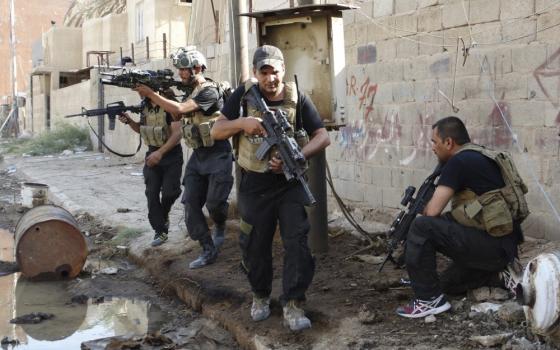In the weeks since I first reported on a group of Iraqi Dominican sisters refusing to leave Mosul after an ISIL takeover, the situation has taken a drastic turn. According to emails I’ve received from Iraq, the sisters left Mosul in late June after a particularly violent interaction between ISIL – the Islamist group also known as ISIS – and the Kurdish militia known as the Peshmerga.
Though the sisters are safely relocated, messages from their prioress say the situation in Iraq is more dangerous than ever. Three days after the sisters had left Mosul, ISIL declared it had established a new Islamic state, or Caliphate, straddling its controlled territories in Iraq and Syria. In a message last week, the prioress said ISIL had occupied and gutted the headquarters of the Chaldean Archdiocese.
“They threw away in the garbage outside the archbishopric all the portraits of Jesus and saints, crosses, and all consecrated items of the church,” she wrote. According to the email, when a Muslim teacher from a nearby mosque asked the armed occupiers not to destroy a sacred place, they placed an “Islamic state flag” on the grounds and declared there could be no Christian churches in an Islamic state.
The sisters had been in contact by phone with ISIL regarding the whereabouts and safety of two kidnapped Chaldean sisters, but according to an email, contact was severed on July 1.
The sisters ask for continued prayers for peace and for an increase of faith.
In fact, as U.S. military advisors are being deployed to Iraq, many Christians are praying for peace and against war. Last month, Pope Francis urged diplomacy in Iraq, and the Mennonite Central Committee is encouraging Americans to write to the president and to their congressional representatives in opposition to military intervention.
It can seem strange to advocate against war in a bloody and violent conflict; personally, I sometimes struggle with the idea of preaching nonviolence in a broken world where violence already reigns supreme. Sure, nonviolence is a great ideal, but can we realistically demand or even expect it from a culture made up of imperfect people?
I don’t know. What I do know is that when a situation becomes Culture vs. Kingdom, Jesus calls us to be countercultural. We are called to respond to hate with love, to embrace humility rather than adoration, to seek solidarity with the least of these rather than the powerful.
In 2009, I heard filmmaker Tom Shadyac speak at an event, and he said something that has stuck with me ever since: If that is the lie of the cultural voice, then rebel. And I think that perfectly sums up how followers of Christ should at least begin framing the issue of peace and nonviolence. We should reject the paradigm in which war is the only answer. And maybe war won’t end in our lifetimes, but we can at least – as the Dominican sisters have urged – pray earnestly that it will.
[Dawn Cherie Araujo is a staff writer for Global Sisters Report.]

